Blog Content
2
Oct
2025
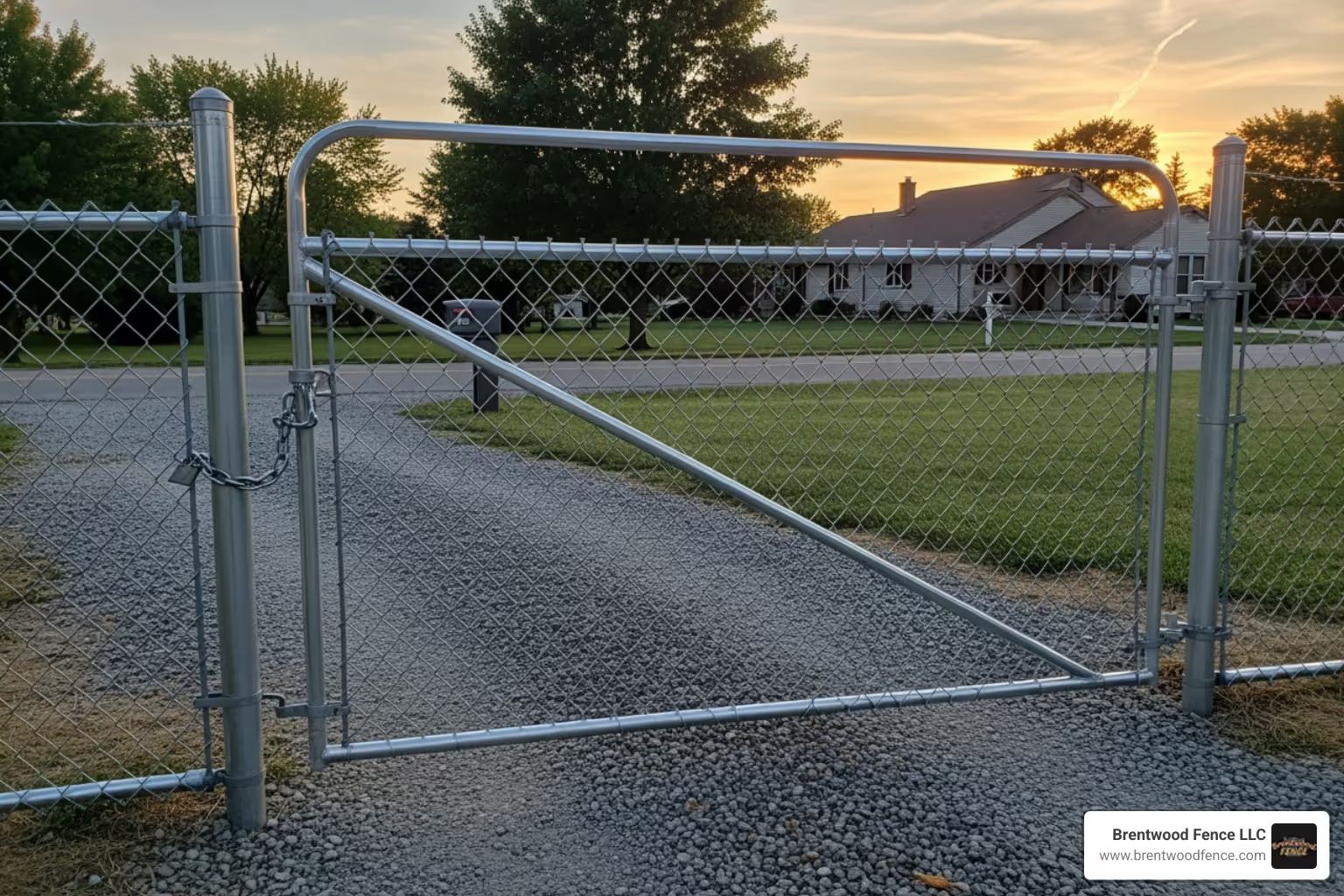
Chain link fencing gates are the access points that make your fence system both secure and functional. Whether you need pedestrian access or vehicle entry, these gates come in multiple styles and materials to match your specific needs.
Quick Overview of Chain Link Gate Types:
Chain link gates offer an unbeatable combination of durability, affordability, and versatility. Available in both galvanized steel and vinyl-coated finishes, they can handle everything from securing a backyard pool to providing vehicle access for commercial properties.
The key to getting the most from your investment lies in choosing the right gate type, materials, and hardware for your specific application. Professional fence installation ensures proper post spacing, hardware alignment, and long-term reliability - critical factors that DIY installations often miss.
Modern chain link gates are far more sophisticated than you might expect. They're available with automatic openers, specialized pool safety features, and attractive vinyl coatings in colors like black and green that improve your property's curb appeal.
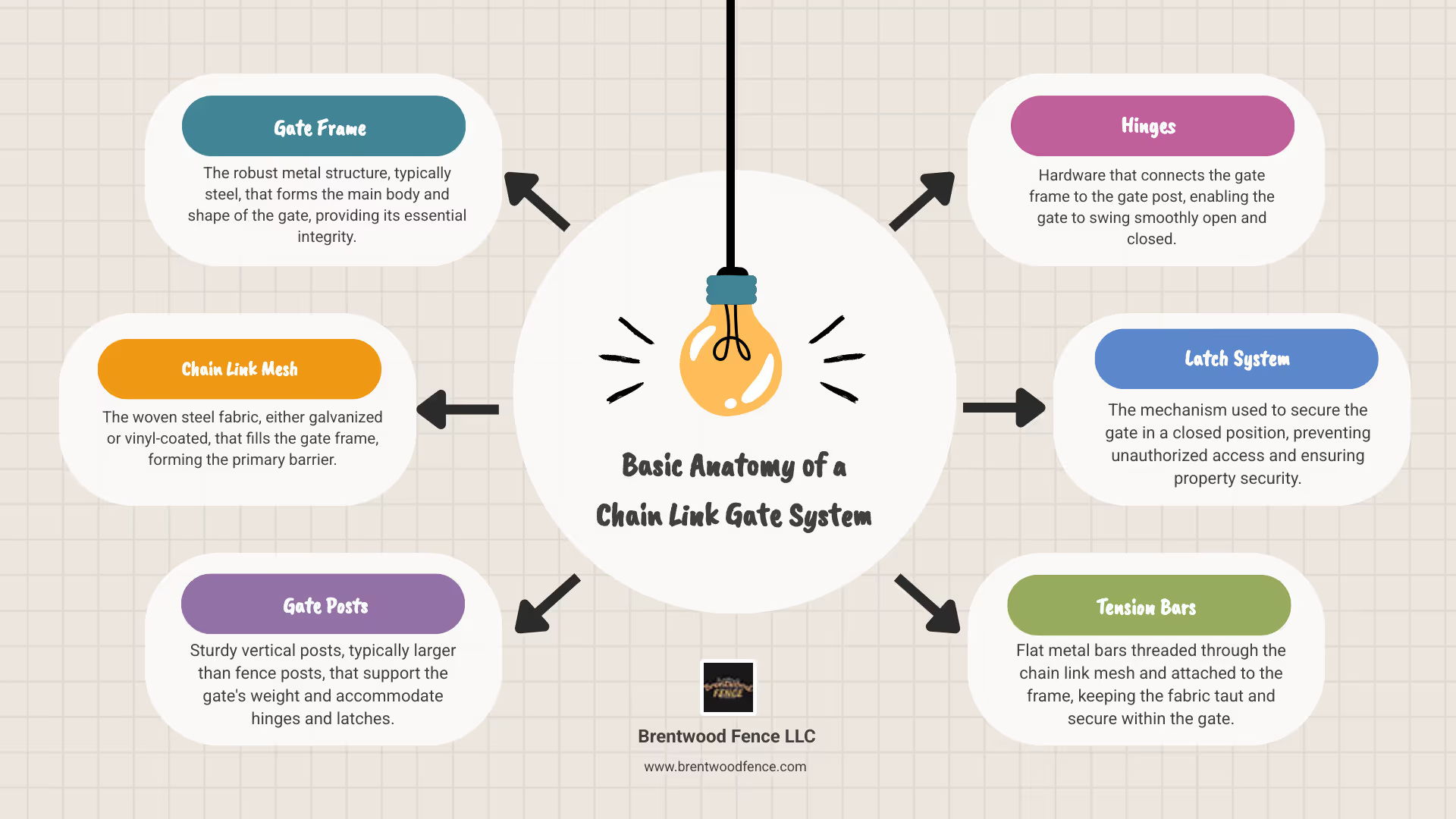
Learn more about chain link fencing gates:
When planning your property's access points, chain link fencing gates offer remarkable versatility. Whether for foot traffic or delivery trucks, there's a gate design for your needs. After years of installing gates across New Hampshire, Massachusetts, and Maine, we've learned that the right gate choice is critical for functionality and long-term satisfaction.
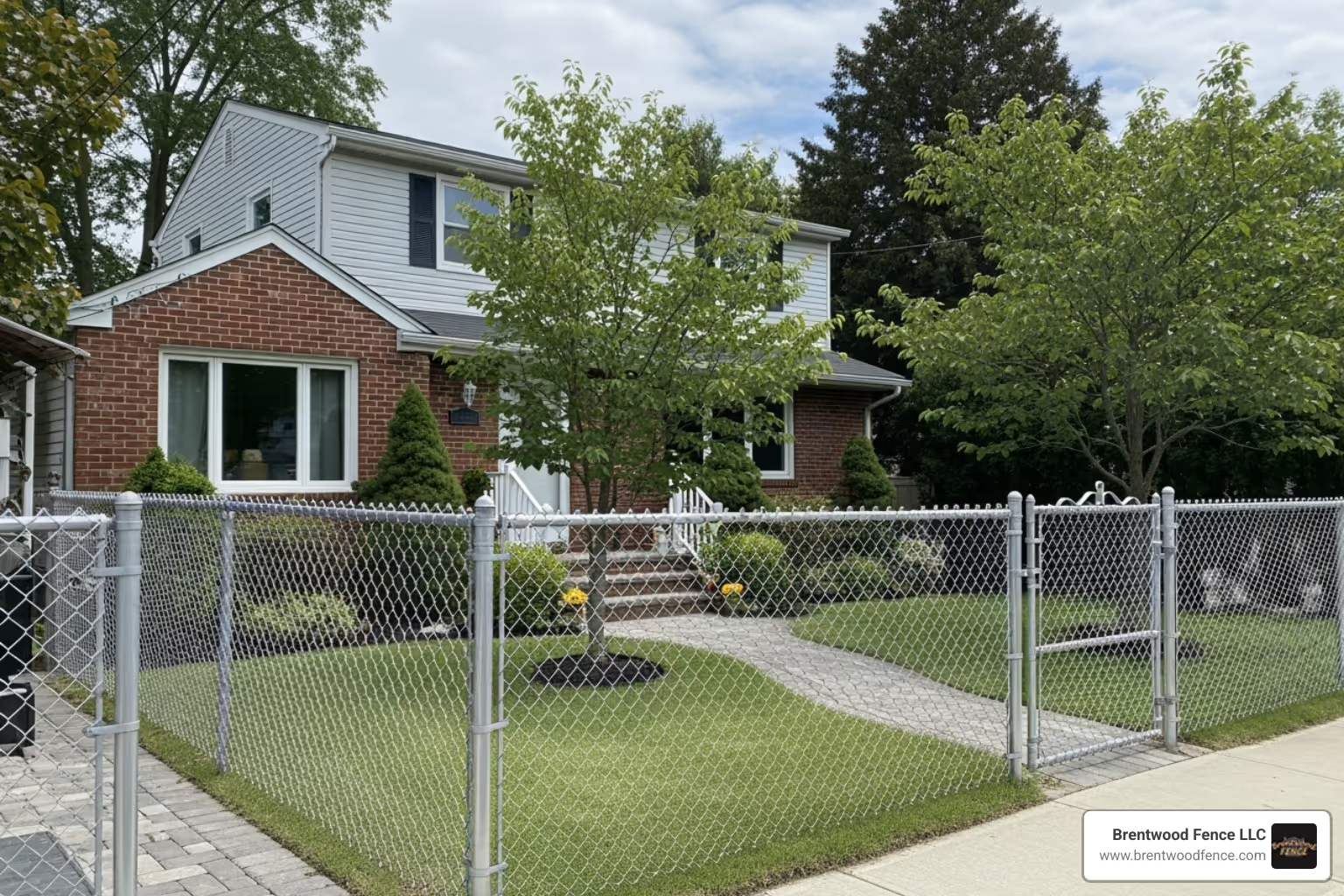
The beauty of chain link fencing gates is their adaptability. Your choice depends on who or what needs to pass through.
Walk gates are single swing gates for pedestrian access, typically 3 to 4 feet wide, matching your fence height. They're perfect for backyard entrances, garden access, or side yard pathways.
Drive gates provide vehicle access. Single swing gates work well for openings up to 20 feet, ideal for residential driveways, but they need clear space to swing open.
For wider driveways, double swing gates are a perfect solution. Two gate panels meet in the middle, accommodating openings up to 40 feet. They are an economical and reliable choice for residential and commercial properties.
Cantilever gates slide open without a ground track, suspended by a counterbalanced roller system. They are fantastic for limited swing space, uneven terrain, or when a clear opening is needed for snow or large vehicles. They also pair well with automatic operators.
Rolling gates are a cost-effective sliding solution using wheels on a ground track, ideal for large openings where swing gates are impractical.
Pool gates are designed for safety, with self-closing hinges and high-mounted, self-latching mechanisms to keep children from unsupervised access. These features are often required by local building codes.
For comprehensive information about chain link fencing options in our service areas, check out our detailed guide on Chain Link Fencing NH, MA, ME.
When selecting chain link fencing gates, you'll find two main frame construction methods.
Welded frame gates are the gold standard for durability. Tubing is welded at the corners, creating a strong, rigid frame with square corners. This design minimizes gaps between the gate and posts, enhancing security.
Bent-tube frame gates use a single piece of tubing bent to form rounded corners. This method is more budget-friendly and suitable for residential use, though the rounded corners create slightly larger gaps at the posts.
The choice balances security and budget. We recommend welded frames for increased security or heavy-duty use. For standard residential use where cost-effectiveness is key, bent-tube construction is an excellent choice. Both types can be customized with various hardware and finishes.
Understanding the materials and components of chain link fencing gates is crucial. After years of installing gates across New Hampshire, Massachusetts, and Maine, we've learned that quality building blocks are the foundation of a gate's performance and longevity.
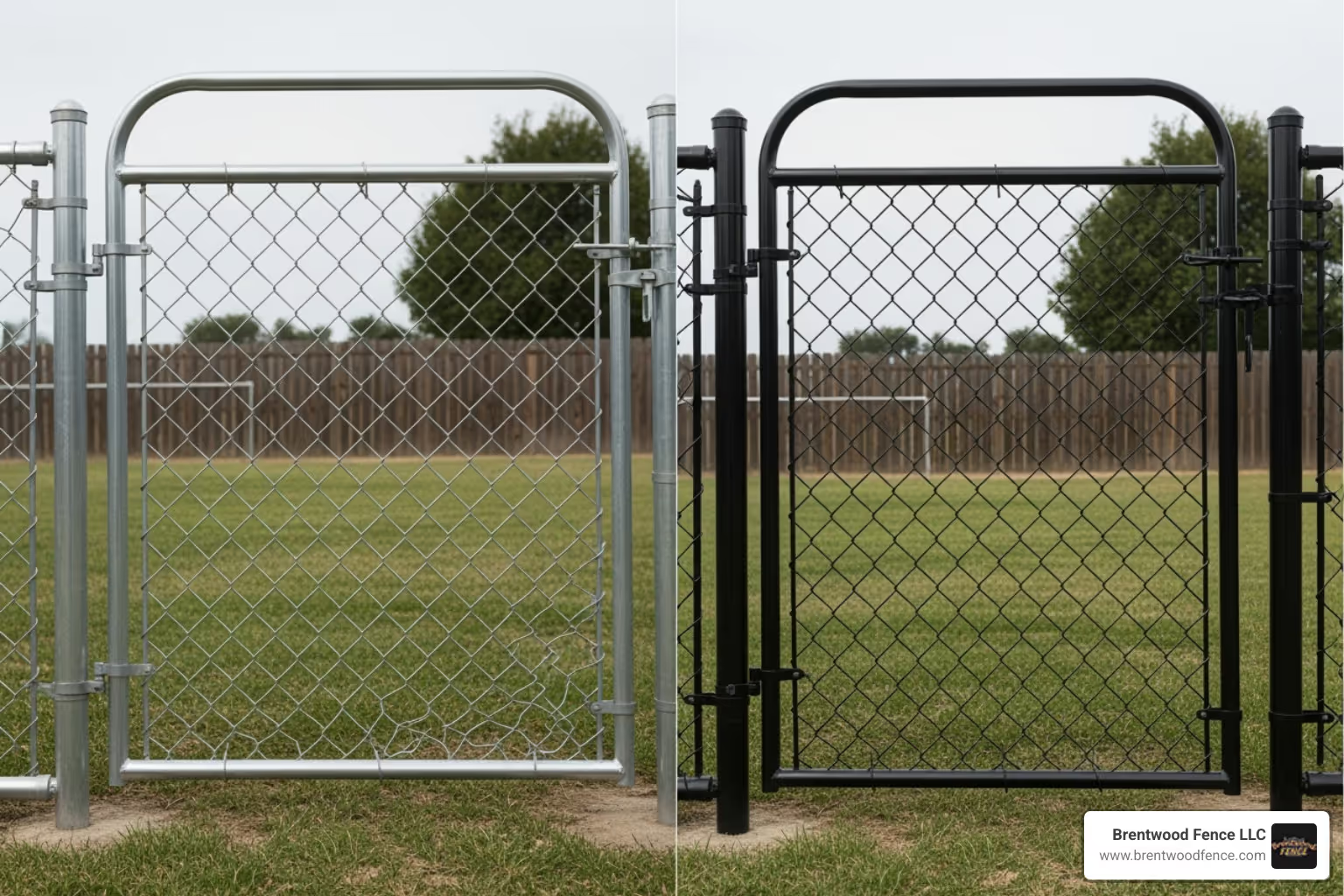
The finish on your chain link fencing gates impacts both longevity and appearance.
Galvanized steel gates are the time-tested workhorses. A zinc coating creates a protective barrier that fights rust and corrosion. This classic silver finish is incredibly durable and requires virtually no maintenance.
Vinyl-coated gates add a layer of PVC coating over the galvanized foundation, extending lifespan and changing appearance. Black vinyl-coated gates offer a sleek, modern look, while green and brown options blend with natural surroundings. The vinyl provides improved weather protection and is easy to clean. While the upfront cost is slightly higher, many clients find the improved aesthetics and durability a worthwhile investment.
For more detailed information about the materials we use in our installations, check out our guides on Chain Link Fence Materials NH, MA, ME and Metal Chain Link Fence NH, MA, ME.
A gate is only as reliable as its hardware. These components ensure your gate operates smoothly for years.
Gate hinges are crucial for any swing gate. Industrial-grade hinges handle the weight and stress of daily operation. For security, professional installers position the top hinge pin down and the bottom pin up to prevent gate removal.
Gate latches secure your property. The simple fork latch is reliable for basic applications, while drop rod systems are perfect for double swing gates. Magnetic latches provide self-latching operation for pool and high-security gates.
Gate posts bear the gate's load, so proper installation is critical. These terminal posts are set deeper in concrete than fence posts and require precise spacing to allow for hardware—typically 3¾ inches for walk gates and 5½ inches for double drive gates.
Tension bars and brace bands keep the chain link fabric attached to the gate frame, ensuring the mesh stays tight to prevent sagging. Learn more about these stabilizing elements in our article about Truss Rod Chain Link Fence NH, MA, ME.
Modern chain link fencing gates can do more than just provide basic access control.
Privacy slats transform open chain link into a private barrier. These vinyl or aluminum strips weave through the mesh, creating visual obstruction. This upgrade gives you privacy fence benefits at chain link prices. Our comprehensive guide on Best Privacy Slats for Chain Link Fence can help you choose.
Lockable latches add security simply. Most latches can accommodate a padlock or have integrated key locks, providing controlled access.
Automatic gate openers combine convenience and security, especially for driveways. These systems allow remote access and ensure the gate closes securely.
Gate height directly impacts security. While 4-foot gates define a property, 6-foot or taller gates are a significant deterrent.
The key to getting the most from these improvements is working with experienced installers who understand how each component integrates with your overall security and aesthetic goals.
Selecting the right chain link fencing gates for your property is like choosing the perfect doorway for your home - it needs to fit just right and serve your specific needs for years to come. We've helped countless homeowners throughout New Hampshire, Massachusetts, and Maine find their ideal gate solution, and we've learned that success comes down to understanding your space, your needs, and getting the measurements spot-on.
The process might seem straightforward, but there are several important factors to consider. Will this be used daily by family members, or just occasionally for maintenance access? Do you need vehicle access for cars, delivery trucks, or landscaping equipment? These questions help guide us toward the perfect solution for your property.
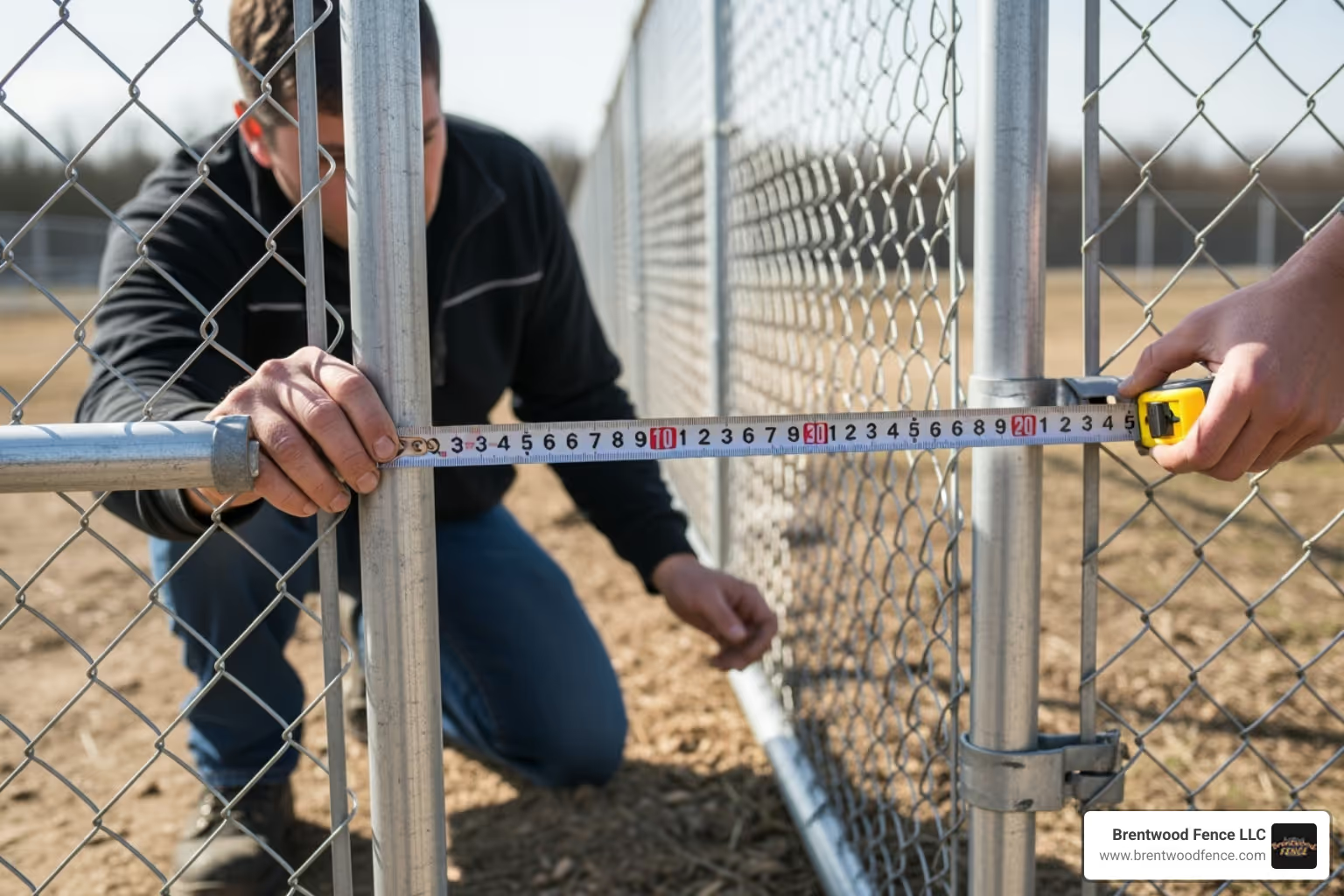
Getting the size right is absolutely critical for chain link fencing gates. Too narrow, and you'll struggle with daily use. Too wide, and you'll compromise security and structural integrity. We always start with precise measurements and a clear understanding of what needs to pass through.
Gate height should match your existing fence line for both security and aesthetic reasons. Most residential applications use standard heights like 4 feet, 5 feet, or 6 feet, though we can install taller gates for improved security or commercial applications. Pool gates, for instance, often require specific heights to meet local safety codes.
When it comes to gate width, your intended use makes all the difference. For pedestrian access, a comfortable walk gate typically measures 3 feet to 4 feet wide - enough space for one person to pass through easily, even when carrying packages or garden tools.
Vehicle access requires more careful planning. A standard residential driveway gate might be 10 to 12 feet wide, often achieved with double swing gates that meet in the middle. For larger vehicles or commercial properties, we might recommend single swing gates up to 20 feet wide, or cantilever gates for even larger openings.
Here's where professional measurement becomes crucial: the "opening size" between your gate posts differs from the actual gate panel width. We account for hardware allowances - typically about 3¾ inches for walk gates and 5½ inches for double drive gates - to ensure proper clearance for hinges and latches. This attention to detail prevents common installation problems and ensures smooth operation.
For comprehensive information about fence heights and their applications, check out our guide on Chain Link Fence Heights NH, MA, ME.
One of the biggest advantages we offer our clients is the flexibility of adjustable gate kits. These aren't your rigid, one-size-fits-all solutions - they're designed to be customized on-site for a perfect fit.
Adjustable width capability means we can take a standard kit and modify it to fit your exact opening, even if it's an unusual size. Got a 58-inch opening? We can adjust a 72-inch kit to fit perfectly, eliminating gaps and ensuring proper security. This flexibility is especially valuable for older properties where openings might not conform to modern standard sizes.
The real magic happens during professional installation. While these kits offer tremendous flexibility, getting them right requires experience and precision. Our team knows how to measure accurately, cut components to size, and assemble everything so your gate operates smoothly from day one. We ensure the gate is perfectly plumb and level, with all hardware properly aligned for long-term reliability.
This on-site customization capability saves time and delivers better results than trying to force a pre-made gate into a space it wasn't designed for. It's one of the reasons we always recommend professional installation for chain link fencing gates - the difference in fit and function is remarkable.
When it comes to chain link fencing gates, the difference between a gate that works beautifully for decades and one that becomes a daily frustration often comes down to installation quality. We've seen too many DIY gate installations that looked fine on day one but started sagging within months. That's why we always recommend professional installation - because nobody wants to wrestle with a stubborn gate every time they come home!
Professional installation isn't just about getting the gate to swing open and closed. It's about understanding how the gate will behave over years of use, through New England's freeze-thaw cycles, and under the stress of daily operation. Our experienced installers know that the details matter, from post depth to hardware spacing, and these details make all the difference in your gate's long-term performance.
Installing chain link fencing gates properly requires attention to several critical factors that ensure stability, smooth operation, and years of reliable service.
Property lines are always our starting point. We verify exact boundaries before any work begins, typically setting posts about 4 inches inside your property line. This prevents any neighbor disputes down the road and ensures your gate is exactly where it should be.
Before we dig a single hole, we contact Dig Safe. This isn't just a good idea - it's essential for safety and avoiding costly utility line damage. Underground cables, gas lines, and water pipes can be anywhere, and marking them first prevents dangerous accidents.
Post depth and concrete footings form the foundation of your gate system. Gate posts bear significantly more stress than regular fence posts, especially for heavier drive gates. We set terminal posts (including gate posts) 2 inches higher than the fence fabric, while line posts sit 2 inches lower. This 4-inch difference ensures proper fence tensioning and perfect gate alignment.
The concrete footings get special attention too. We crown them at ground level, sloping away from the post to direct water away. This simple detail prevents water pooling that could eventually compromise the post stability.
Precise hinge and latch spacing separates professional installation from amateur attempts. The distance between gate posts must account for the gate width plus allowances for hardware. Walk gates need about 3¾ inches of extra space, while double drive gates require 5½ inches. Get this wrong, and your gate either won't close properly or leaves unsightly gaps.
Gate alignment is where craftsmanship really shows. A professionally installed gate hangs perfectly plumb and level, swinging smoothly without binding or dragging. We install hinges strategically - top hinge pin pointing down, bottom pointing up - which prevents anyone from lifting the gate off its hinges for security.
Chain link fencing gates are wonderfully low-maintenance, but a little attention keeps them operating like new for decades. Think of it as the difference between a car that gets regular oil changes and one that doesn't!
Regular inspection catches small issues before they become big problems. Every few months, take a quick look at your gate. Check for loose bolts, bent sections, or damaged mesh. Spotting these early saves money and prevents frustration.
Cleaning is simple but effective. Soap and water work perfectly, especially for vinyl-coated gates. Remove dirt, debris, and those inevitable spider webs that seem to appear overnight. A clean gate not only looks better but also lets you spot potential issues more easily.
Hinge lubrication keeps everything moving smoothly. Over time, hinges can become stiff or develop that annoying squeak. A quick spray of silicone lubricant on the hinge pins solves this instantly. This is especially important in dusty areas or during extreme temperature changes.
Latch alignment deserves attention if your gate becomes difficult to latch. Usually, a simple adjustment fixes sticky latches. Check for obstructions or slight misalignment that prevents smooth operation.
Bolt tightening is a quick maintenance task that prevents bigger issues. Normal use and vibration can gradually loosen bolts on hinges, latches, and frame connections. A periodic check with a wrench keeps everything tight and secure.
Rust prevention is rarely needed with quality galvanized gates, thanks to their protective zinc coating. However, if the coating gets damaged by a deep scratch, touching up the exposed steel with cold galvanizing compound prevents rust from starting. Vinyl-coated gates have an extra layer of protection that makes this even less of a concern.
With these simple maintenance habits, your chain link fencing gates will provide reliable access and security for many years to come. It's amazing how a few minutes of attention twice a year can keep a gate working perfectly for decades!
Over our years of installing chain link fencing gates throughout New Hampshire, Massachusetts, and Maine, we've heard just about every question you can imagine. Some make us chuckle (like "Will my gate keep out flying squirrels?"), while others are genuinely important for safety and functionality. Here are the questions that come up most often, along with our straightforward answers.
Absolutely! This is one of our favorite upgrades to recommend, especially for busy families or commercial properties. Most swing gates and cantilever chain link fencing gates work beautifully with automatic openers.
The convenience factor is huge - imagine never having to get out of your car in a snowstorm or rainstorm again. You can control your gate with keypads, remote controls, or even smartphone apps. It's like having a doorman for your driveway!
Professional installation is crucial for automated systems. The gate needs perfect alignment, proper safety features, and seamless integration with the operator. When done right, these systems work reliably even when Mother Nature throws her worst weather at them. When done wrong? Well, let's just say you might find yourself back to opening gates manually sooner than you'd like.
Here's where a little planning goes a long way. A swing gate needs a completely clear area equal to its full width to open properly. Picture the arc your gate makes as it swings - that entire space must stay obstacle-free.
This means no parked cars, no landscaping, no snow piles, and no sloped ground in the gate's path. We've seen too many frustrated homeowners who didn't consider that beautiful garden bed they planted right where their gate needed to swing!
If you're dealing with limited space or obstacles you can't move, don't worry. Cantilever gates and rolling gates are fantastic alternatives. These chain link fencing gates slide open instead of swinging, so they need much less clearance. They're perfect for tight spaces or properties with challenging layouts.
Pool gates are in a league of their own when it comes to safety requirements. These specialized chain link fencing gates have one critical job: keeping unsupervised children away from the water.
The key differences are all about automatic safety features. Pool gates are self-closing, meaning spring-loaded or hydraulic hinges automatically pull them shut after someone passes through. They're also self-latching, so the latch automatically engages when the gate closes - no fumbling with latches required.
Most pool codes require these gates to open outward, away from the pool area. This prevents a child from potentially pushing against the gate if they were in distress in the water.
The latch height is specifically regulated too, typically mounted 54 inches or higher from the bottom of the gate. This puts it well out of reach of small children while remaining accessible to adults and older kids.
These aren't just suggestions - they're legal requirements in most areas. More importantly, they're designed to give you peace of mind that your pool area is as safe as possible for your family and guests.
Choosing the perfect chain link fencing gates for your property is one of those decisions that pays dividends for years to come. Throughout this guide, we've walked through everything from basic walk gates to sophisticated automated systems, and one thing becomes crystal clear: these aren't just simple openings in your fence – they're carefully engineered access solutions.
The versatility of chain link fencing gates truly shines when you consider the range of options available. Whether you're looking at a galvanized steel gate for maximum durability and cost-effectiveness, or a sleek vinyl-coated option in black or green for improved curb appeal, there's a solution that fits both your practical needs and aesthetic preferences.
What really sets chain link gates apart is their ability to grow with your needs. Start with a basic walk gate, and later add privacy slats for increased concealment. Need vehicle access? A double swing gate or cantilever system can handle everything from daily commutes to delivery trucks. Pool safety requirements? Self-closing, self-latching mechanisms ensure your family's protection while maintaining easy access.
The durability factor can't be overstated. These gates are built to handle whatever Mother Nature throws at them – from New England's harsh winters to humid summer storms. With proper professional installation, your gate will swing smoothly and latch securely for decades, requiring only minimal maintenance like occasional hinge lubrication and bolt tightening.
Professional installation makes all the difference between a gate that functions flawlessly and one that becomes a constant headache. Proper post depth, precise hinge alignment, and correct hardware spacing aren't just technical details – they're the foundation of a gate system that serves you reliably year after year.
At Brentwood Fence LLC, we understand that every property is unique. Whether you're securing a cozy backyard in New Hampshire, managing access to a commercial facility in Massachusetts, or protecting a pool area in Maine, we bring the expertise to match the right gate to your specific situation.
Ready to improve your property's security and functionality? Our team is here to guide you through every step of the process, from initial consultation to final installation. Explore our comprehensive Chain Link Fencing Installation Services and find how the right chain link fencing gates can transform your property's access control while providing the security and peace of mind you deserve.
Copyright 2022 Brentwood Fence | All Rights Reserved | Sitemap | Website by Plumb Development a Digital Marketing Agency